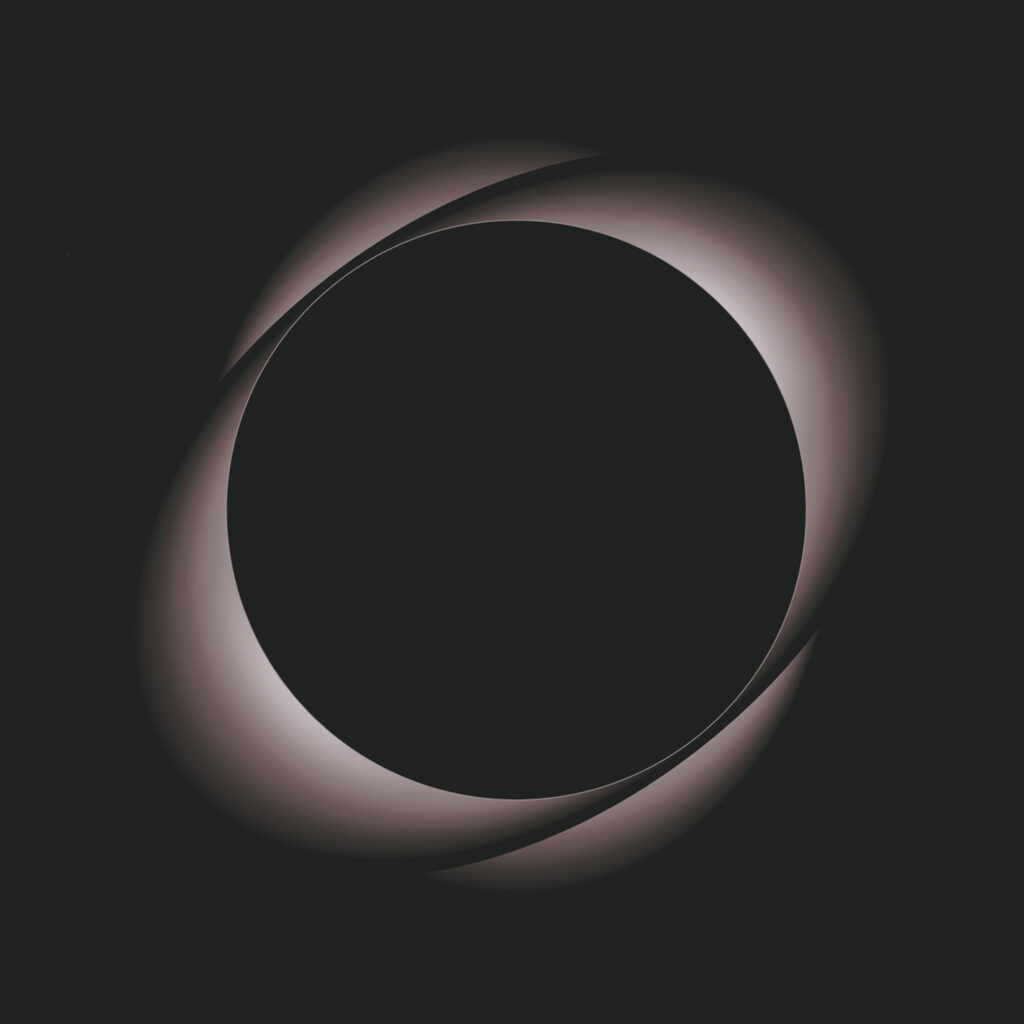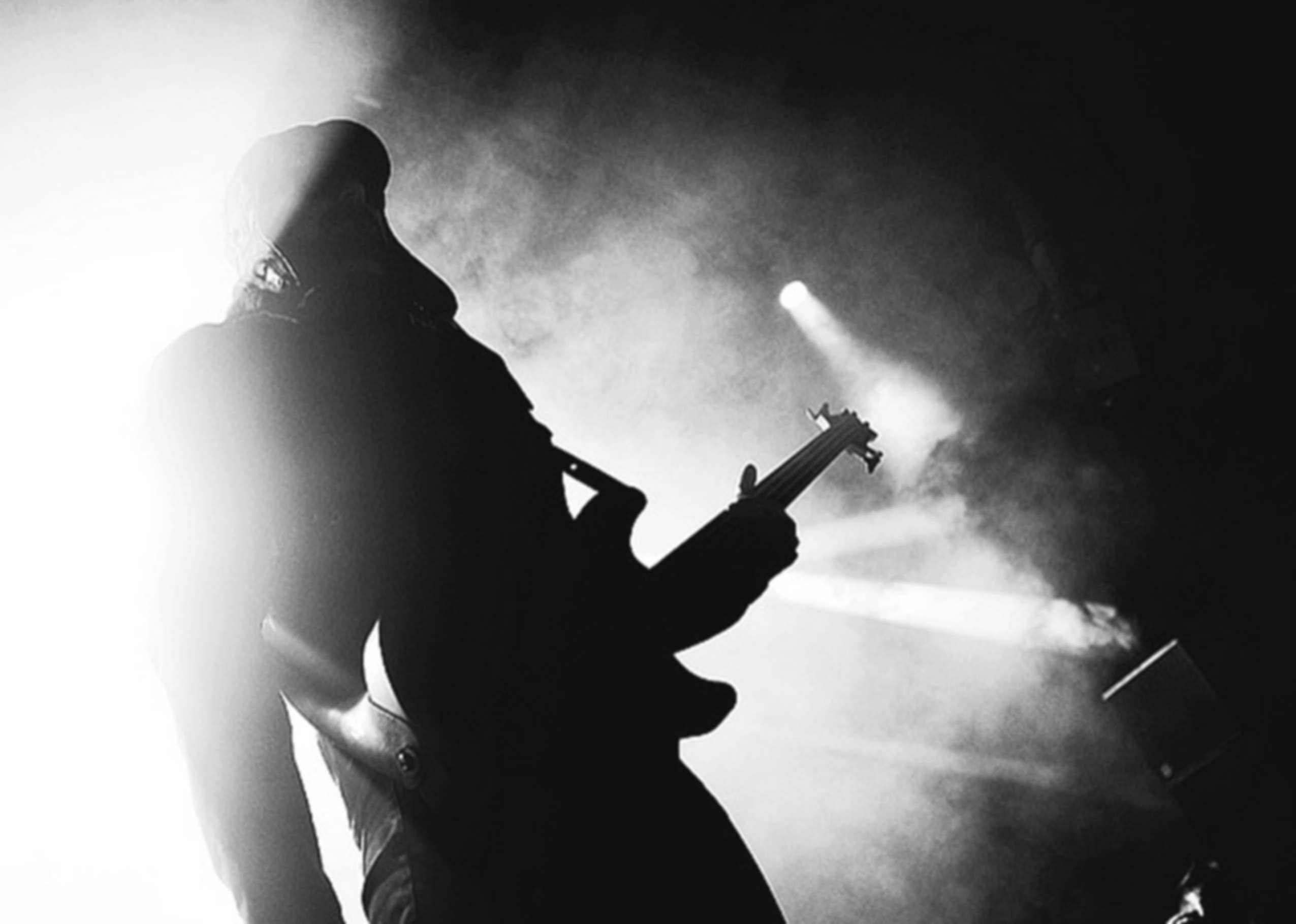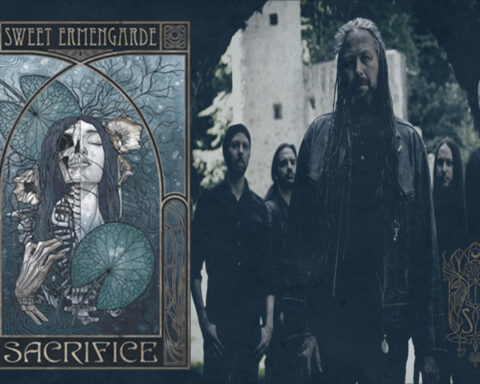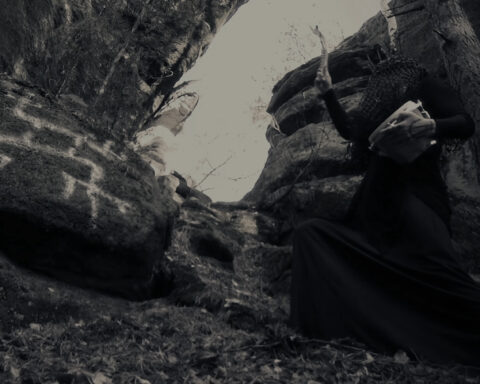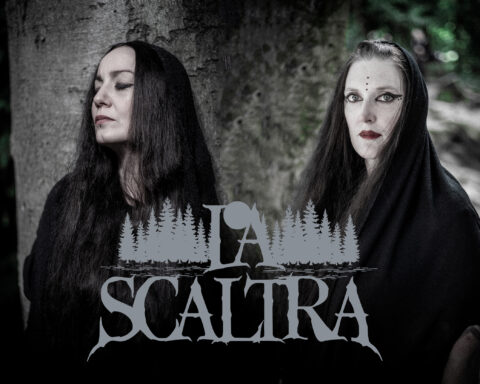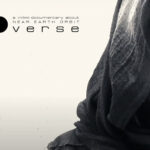[german version – english below]
Die Realität hat die Fiktion überholt. „M.A.S.S. Extinction“ erscheint inmitten der Corona-Pandemie und ist – wenn auch unfreiwillig – der apokalyptische Soundtrack zum Coronavirus und gleichermaßen ein visionärer Blick in die Zukunft, auf all die Katastrophen, die noch kommen werden. Gedankenspiele mit Endzeitszenarien, die Warnung vor den von Menschen gemachten Katastrophen wie der Erderwärmung und die Vorahnung kommenden Unheils ziehen sich durch das gesamte Werk von NEAR EARTH ORBIT. Dass allerdings gerade jetzt „M.A.S.S. Extinction“ erscheint, ist auf beängstigende Art prophetisch. Wir sprachen mit Artaud Seth darüber, wie es ist, wenn Befürchtungen plötzlich Realität werden.
Wie gehst du damit um, dass jetzt eine von Dir aufgegriffene Krise real existent ist? Was bedeutet es für dich und dein Schaffen, dass aus einem Gedankenspiel Realität wurde? Artaud: Für mich sind und waren alle Szenarien, die N.E.O. bisher skizziert haben, immer präsent oder zumindest deutlich erkennbar. Eine Pandemie war statistisch gesehen, und in Anbetracht der immer weiterwachsenden Weltbevölkerung längst überfällig. Erstaunlich ist doch eher, wie unvorbereitet uns alle Covid19 traf. Wir leben doch schon lange in und mit mehreren großen Bedrohungs-Situationen. Sei es die atomare Auslöschung, Klimawandel, kosmische Einschläge oder unkontrollierbare Technologien. Ich bin doch nicht der Einzige, der diese Gefahren sieht. Die wirkliche Frage ist doch die: Warum verdrängen wir das? Warum kümmern wir uns nicht um Lösungen? Warum reagieren wir erst, wenn die Katastrophe schon da ist?
Der Titel des Albums „M.A.S.S. Extinction“ klingt in der jetzigen Zeit nahezu prophetisch, so als hättest du bereits im Studio geahnt, dass eine Krise auf uns zukommt. Kannst du bitte erläutern, warum du ihn gewählt hast? Artaud: Der Titel bezieht sich auf die größte Herausforderung, die der Mensch primär zu bewältigen hat: den Klimawandel. Wenn wir es nicht schaffen, die Geburtenraten deutlich zu senken und mit den vorhandenen Ressourcen besser zu haushalten, werden wir es nicht nur mit einer pandemischen Katastrophe die vielleicht 1% der Weltenbürger auslöschen kann, zu tun haben, sondern mit einer, deren Mortalität bei 100% liegen wird. Auch hier befürchte ich, dass wir erst reagieren, wenn es schon zu spät ist.
Was war dein erster Gedanke bei Ausbruch der Corona-Krise? Artaud: Auch nicht viel anders als bei Dir, vermute ich. Man hat Fragen: Bleibt das eine lokale Epidemie? Wie gefährlich ist das Virus? Was kann man im Fall der Fälle tun, um sich selbst und seine Nächsten zu schützen? Von dem Moment an, wo die Chinesen allerdings angefangen haben, ihre Einwohner einzusperren und das mit drakonischen Mittel kontrollierten, war mir absolut klar, dass hier etwas Großes und sehr Bedrohliches im Anmarsch war. Keine Grenze, kein Verbot, keine Maßnahme hält ein derart infektiöses Virus auf.
Wie verbringst du, wie verbringt ihr die Zeit der Isolation? Wie wichtig ist für dich die Interaktion mit anderen Menschen? Benötigst du andere Sichtweisen, andere Aspekte zur eigenen Weiterentwicklung? Artaud: Jawa und ich teilen wohl dasselbe Schicksal wie viele von uns gerade: wir sitzen Zuhause und versuchen, das Beste aus der Situation zu machen. Meine lebenslange Erfahrung eher zurückgezogen und kontaktarm zu leben, hilft. Für mich hat sich eigentlich nicht viel verändert. Mir ist aber durchaus bewusst, dass das für viele sehr belastend sein kann. Ob ich andere Sichtweisen und Aspekte für meine Weiterentwicklung brauche? Musikalisch, nein. Soziologisch, natürlich ja.
Welche Befürchtungen hat das bei dir wachgerufen? Artaud: Genau die, die jetzt eingetroffen sind. Überlastete Krankenhäuser weltweit, massenhaftes Sterben in Ländern mit kaputtgesparten Gesundheitssystemen und natürlich den enormen ökonomischen Verwerfungen, die noch vor uns stehen. Warum ist es eigentlich möglich, dass das Tun eines Einzelnen in China dazu führt, dass weltweit die Wirtschaft auf Jahre zusammenbricht oder gar zu einem kompletten Kollaps führt? Dieses höchst fragile kapitalistische System, was mehr auf Emotion als auf Ratio funktioniert, sollten wir dringend überdenken!
Wird es ein Umdenken geben? Wagst du einen Blick in Zukunft? Artaud: Ich würde mir eine radikale Umordnung der Gesellschaft in eine ökologischere, sozial gerechtere und vor allem, innovativere Gesellschaft wünschen. Mehr Mut zu Veränderungen, raus aus dem Dogma des Wachstums hin zu neuen Ideen und Lösungen. Das rückwärtsgewandte, konservative Denken muss aus den Köpfen, um Platz für eine zukunftsfähige Vision einer neuen Gesellschaftsform zu schaffen.
Hier auf der Erde oder auf einem interplanetaren Generationen Raumschiff, um im NEO Kontext zu bleiben? Artaud: Beides.
Gibt es einen Song, der eine ganz besondere Bedeutung für dich hat? Artaud: Ich mag tatsächlich alle Songs sehr. Vielleicht sticht INTERSTELLAR etwas heraus. Derartige Songs, die einen richtig fesseln und mitnehmen können, gelingen einem nicht jeden Tag. Und das über eine Länge von knapp 13 Minuten. POPULATION OVERLOAD hat eine starke Message, wie ich finde. Die Grafiken am Anfang des Videos zeigen die Geburtenraten in 1000 Einheiten pro Sekunde an. Man muss sich nur mal vor Augen führen, dass wir allein in den letzten 100 Jahren unsere Weltbevölkerung von knapp 2 Milliarden auf bald 8 Milliarden geschraubt haben! Und die Erde wächst nicht mit.
Musikalisch tritt im neuen Werk von N.E.O. eine düstere Melodiösität und Tanzbarkeit in den Vordergrund. Die ersten Stücke „Population Overload“, „Moon Rush“ und „Critical Mass“ laden ein zum ekstatischen Totentanz, zum hypnotisch tranceartigen Wirbeln, Kreisen und Versinken. Dazu bedrohende und befremdliche Passagen in Tracks wie „Global Warming“, „End Of Nature“ und „Interstellar“. Das ganze Album wirkt wie aus „einem Guss“ und folgt einem klar erkennbaren Roten Faden. Wie schreibt man ein Album, in welchem die einzelnen Tracks ein derartiges Gesamtkunstwerk ergeben? Artaud: Sollen wir jetzt ein Produzenten Gespräch führen?
Gerne! Artaud: Und wie sieht eigentlich ein ekstatischer Totentanz zu N.E.O. Songs aus? Egal. Okay, dann ein Produzenten Gespräch. Das ist tatsächlich etwas, was ich durch die Jahre gelernt habe. Man schreibt alle seine Ideen in ein Projekt. Die heutige Technik macht es möglich, dies zu tun. Ich bin ja ein recht umtriebiger Produzent, was die Quantität von Veröffentlichungen angeht. Das liegt einfach daran, dass ich meinen „Sound“ gefunden habe und eine Art Grundeinstellung in mein Aufnahmesystem implementiert habe. In meinem Fall ist das Cubase, ein Sequenzer basiertes Aufnahmeprogramm. Die einzelnen Spuren sind in Instrumentengruppen unterteilt, denen wiederum eine bestimmte Signalkette zugeordnet ist und am Ende stehen die Mastereffekte, in die ich quasi hineinmische. So habe ich quasi ein Template für meine Aufnahmen. Das ermöglicht mir, mich weniger um den Mix kümmern zu müssen als um das eigentliche Songwriting. Ich schreibe also alle Demos in ein Projekt und kann jederzeit beurteilen, ob die Songs zueinander passen oder nicht. Ich hoffe, das war jetzt nicht zu technisch.
Wie wichtig ist dir deine Privatsphäre? Artaud: Schon sehr. Obwohl es kaum einen Unterschied macht, ob ich etwas öffentlich Wahrnehmbares oder Privates mache. Aber muss man wirklich jede Belanglosigkeit teilen, mögen oder liken? Das Alltägliche mag für viele interessant sein, für mich ist es das nicht. Es widerstrebt mir, mich als Person zu sehr in den Mittelpunkt meines Tuns zu stellen. Meine Musik, deren Konzepte und Texte, ermöglichen es Jedem mir näher zu sein, wenn er/sie/es es denn möchte.
Euer fantastisches Video zu INTERSTELLAR wirkt fast schon, wie ein postapokalyptischer Kurzfilm. Wer hatte die Idee dazu? Und wer hat es produziert? Artaud: Die Idee hatten wir selber. Auch die Umsetzung, der Schnitt und die Ausstattung stammen von uns. Beim Dreh sowie bei der Auswahl der Drehorte hat uns ein befreundeter Kameramann geholfen. Wir produzieren die meisten Videos mittlerweile komplett autark. Für mich ist die visuelle Umsetzung der Songs genauso wichtig, wie der Song an sich. Leider stößt man immer wieder an die Grenzen des Machbaren, da meine exoplanetarische oder postapokalyptische, textliche Ebene von NEAR EARTH ORBIT naturgemäß ein Setting verlangt, welches es entweder nicht gibt oder nur schwer realisierbar ist. Aber wir bemühen uns, dem nahe zu kommen.
Zeitgleich zum neuen Album habt ihr einen überarbeiteten Backkatalog veröffentlicht. Wie kam es dazu? Artaud: Ich hatte schon länger den Drang verspürt alle Alben auf ein produktionstechnisches Level anzupassen. Da fast alle Alben nahezu ausverkauft waren, dachte ich, es wäre jetzt eine gute Gelegenheit für eine überarbeitete 2. Auflage. Ich finde, es klingt nun alles stimmiger und ich war überrascht, was man aus den Songs noch alles so rausholen konnte. Auch die Artworks sind nun alle einheitlich. Es sieht verdammt gut aus, klingt hervorragend und man kann sie wirklich als Sammeledition verstehen. Nebeneinander gelegt ergibt sich nicht nur inhaltlich ein großes, ganzes Weltunter-Szenario. Es erklärt den Niedergang in 4 Kapiteln.
Was bedeutet das Zitat von Einstein „Die Welt wird nicht bedroht von den Menschen, die böse sind, sondern von denen, die das Böse zulassen“ für dich, dass du im Booklet zitierst? Artaud: Kann es eine bessere Aussage für unsere jetzige Situation geben? Wir machen uns doch unsere Katastrophen selbst. Wir müssen handeln!
.
.
.
.
.
.
[english version – german above]
Reality has surpassed fiction. „M.A.S.S. Extinction“ is being released amidst the Corona pandemic and is – albeit unintentionally – the apocalyptic soundtrack to the coronavirus and at the same time a visionary look into the future, at all the disasters that are yet to come. Thought experiments with end-time scenarios, warnings of man-made disasters like global warming, and the foreboding of impending doom run through the entire work of NEAR EARTH ORBIT. However, the fact that „M.A.S.S. Extinction“ is being released right now is eerily prophetic. We spoke with Artaud Seth about what it feels like when fears suddenly become reality.
How do you deal with the fact that a crisis you addressed is now real? What does it mean for you and your work that a thought experiment has become reality? Artaud: For me, all the scenarios that N.E.O. has sketched so far have always been present or at least clearly visible. Statistically speaking, and considering the ever-growing world population, a pandemic was long overdue. It’s more astonishing how unprepared we all were for Covid-19. We have been living with multiple major threats for a long time. Be it nuclear annihilation, climate change, cosmic impacts, or uncontrollable technologies. I am not the only one who sees these dangers. The real question is: Why do we ignore them? Why don’t we care about solutions? Why do we only react when the catastrophe is already here?
The title of the album „M.A.S.S. Extinction“ sounds almost prophetic in the current time, as if you already foresaw a crisis in the studio. Can you explain why you chose it? Artaud: The title refers to the greatest challenge humanity primarily has to face: climate change. If we don’t manage to significantly lower birth rates and better manage the resources we have, we will not only face a pandemic catastrophe that might wipe out 1% of the world’s population but one with a mortality rate of 100%. Here too, I fear we will only react when it is already too late.
What was your first thought at the outbreak of the Corona crisis? Artaud: Not much different from yours, I suppose. You have questions: Will this remain a local epidemic? How dangerous is the virus? What can you do to protect yourself and your loved ones if necessary? From the moment the Chinese started locking up their residents and controlling it with draconian measures, it was absolutely clear to me that something big and very threatening was on the way. No border, no ban, no measure can stop such an infectious virus.
How are you spending the time in isolation? How important is interaction with other people to you? Do you need other perspectives and aspects for your personal development? Artaud: Jawa and I share the same fate as many of us right now: we sit at home and try to make the best of the situation. My lifelong experience of living rather withdrawn and with little contact helps. For me, not much has changed. But I am aware that this can be very burdensome for many. Do I need other perspectives and aspects for my personal development? Musically, no. Sociologically, of course, yes.
What fears has this awakened in you? Artaud: Exactly the ones that have now come true. Overloaded hospitals worldwide, mass deaths in countries with underfunded health systems, and of course the enormous economic upheavals that are still ahead of us. Why is it actually possible for the actions of one person in China to cause the global economy to collapse for years or even completely? This highly fragile capitalist system, which operates more on emotion than reason, urgently needs to be reconsidered!
Will there be a rethink? Do you dare to look into the future? Artaud: I would wish for a radical reorganization of society into a more ecological, socially just, and above all, more innovative society. More courage for change, away from the dogma of growth towards new ideas and solutions. The backward-looking, conservative thinking must be eradicated to make room for a viable vision of a new form of society.
Here on Earth or on an interplanetary generational spaceship, to stay in the NEO context? Artaud: Both.
Is there a song that has a very special meaning for you? Artaud: I actually like all the songs very much. Perhaps INTERSTELLAR stands out a bit. Such songs that can really captivate and take you away are not created every day. And that over a length of almost 13 minutes. POPULATION OVERLOAD has a strong message, I think. The graphics at the beginning of the video show the birth rates in 1000 units per second. You just have to realize that in the last 100 years alone we have increased our world population from just under 2 billion to almost 8 billion! And the Earth is not growing with us.
Musically, the new work of N.E.O. features a dark melodiousness and danceability. The first tracks „Population Overload,“ „Moon Rush,“ and „Critical Mass“ invite an ecstatic dance of death, a hypnotic, trance-like whirl, circle, and immersion. In addition, there are threatening and unsettling passages in tracks like „Global Warming,“ „End Of Nature,“ and „Interstellar.“ The entire album seems like it is made „of one piece“ and follows a clearly recognizable red thread. How do you write an album in which the individual tracks create such a comprehensive artwork? Artaud: Are we going to have a producer conversation now?
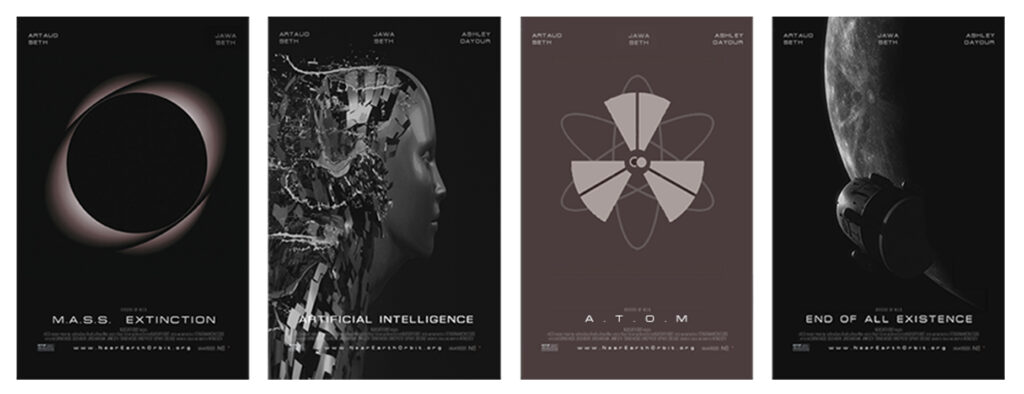
Gladly! Artaud: And what does an ecstatic dance of death to N.E.O. songs actually look like? Never mind. Okay, then a producer conversation. This is indeed something I have learned over the years. You write all your ideas into a project. Today’s technology makes this possible. I am a rather busy producer in terms of the quantity of releases. This is simply because I have found my „sound“ and have implemented a kind of basic setting in my recording system. In my case, it’s Cubase, a sequencer-based recording program. The individual tracks are divided into instrument groups, each of which is assigned a specific signal chain, and in the end, there are the master effects into which I mix. So I have a kind of template for my recordings. This allows me to focus less on the mix and more on the actual songwriting. So I write all demos into one project and can always assess whether the songs fit together or not. I hope that wasn’t too technical.
How important is your privacy to you? Artaud: Very important. Although it makes little difference whether I do something publicly perceptible or private. But do you really have to share, like, or comment on every triviality? The everyday may be interesting for many, but it is not for me. It goes against my grain to put myself too much in the center of my actions. My music, its concepts, and texts allow anyone to be closer to me if he/she/it wishes to do so.
Your fantastic video for INTERSTELLAR almost looks like a post-apocalyptic short film. Who came up with the idea? And who produced it? Artaud: We came up with the idea ourselves. The implementation, the editing, and the equipment also come from us. A friend who is a cameraman helped us with the shoot and the selection of the locations. We now produce most of the videos completely independently. For me, the visual realization of the songs is just as important as the song itself. Unfortunately, you keep coming up against the limits of what is feasible because my exoplanetary or post-apocalyptic textual level of NEAR EARTH ORBIT naturally demands a setting that either does not exist or is difficult to realize. But we try to get close to it.
At the same time as the new album, you have released a revised back catalog. How did that come about? Artaud: I had long felt the urge to bring all the albums to the same production level. Since almost all the albums were nearly sold out, I thought it would be a good opportunity for a revised second edition. I think everything sounds more coherent now and I was surprised at what more you could get out of the songs. The artworks are now all uniform as well. It looks damn good, sounds great, and can really be understood as a collector’s edition. Laid out side by side, it not only presents a comprehensive end-of-the-world scenario in terms of content but explains the decline in 4 chapters.
What does Einstein’s quote „The world will not be destroyed by those who do evil, but by those who watch them without doing anything“ mean to you, which you quote in the booklet? Artaud: Can there be a better statement for our current situation? We create our catastrophes ourselves. We have to act!
